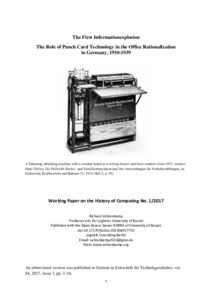| dc.date.accessioned | 2023-04-11T10:07:33Z | |
| dc.date.available | 2023-04-11T10:07:33Z | |
| dc.date.issued | 2022-06-20 | |
| dc.identifier | doi:10.17170/kobra-202304017750 | |
| dc.identifier.uri | http://hdl.handle.net/123456789/14574 | |
| dc.language.iso | eng | eng |
| dc.rights | Attribution-NonCommercial-NoDerivatives 4.0 International | * |
| dc.rights.uri | http://creativecommons.org/licenses/by-nc-nd/4.0/ | * |
| dc.subject | dehomag | eng |
| dc.subject | IBM | eng |
| dc.subject | powers | eng |
| dc.subject | perforator | eng |
| dc.subject | sorting machine | eng |
| dc.subject | tabulating machine | eng |
| dc.subject | counter | eng |
| dc.subject | information explossion | eng |
| dc.subject | office work | eng |
| dc.subject | office machine | eng |
| dc.subject | sales system | eng |
| dc.subject | punch card | eng |
| dc.subject | punched card | eng |
| dc.subject | liquefaction of information | eng |
| dc.subject | typewriter | eng |
| dc.subject | adder machine | eng |
| dc.subject | feminization | eng |
| dc.subject.ddc | 300 | |
| dc.subject.ddc | 900 | |
| dc.subject.ddc | 600 | |
| dc.title | The First Informationexplosion | eng |
| dc.type | Working paper | |
| dcterms.abstract | The paper places punch card technology in the context of the office machine industry in Germany and discusses the exciting relationship between the two competitors on the market for punch card technology, Dehomag and Powers, in Germany. The question is whether the leading role of the United States in the use of office machines frequently cited by Anglo-American authors really applies. How punch card technology in Germany has advanced from its beginnings is discussed under the heading of rationalisation strategies. The technologies of the punching machine, the sorting machine and the tabulating machine are shown and an example of tabulating a sales table is given. At the example of a chocolate producer a punch card is discussed of how the various products of the chocolate plant are organized on the card. The punch card could use only one thousandth of the information content available in the binary number system. The buzzword of the information explosion, which was introduced into the debate by Lars Heide, will be filled in here. Many examples are given how the use of punch card technology expands the demand for information. The paper gives evidence for the suggestion of Theo Pirker that formalization of information induces the growth of the information department in enterprises so that the rationalization is absorbed by expansion. This process is labeled as informationexplosion and the paper portrays the first informationexplosion in history. The article concludes with an overview of how punch card technology fits into the broader debate about the feminisation of the office. The research in the eBook is based on various archives: The Federal Archive Berlin, the State Archive Berlin, the Economic Archive Baden–Württemberg in Hohenheim, the corporate archive of Bayer AG in Leverkusen, the archive of Deutsche Museum Munic, the archive auf Technikmuseum Berlin, and the Municipial Archive Nuremberg. | eng |
| dcterms.accessRights | open access | |
| dcterms.creator | Vahrenkamp, Richard | |
| dcterms.extent | 61 Seiten | |
| dc.contributor.corporatename | Kassel, Universität Kassel, Fachbereich Wirtschaftswissenschaften | ger |
| dc.subject.swd | Deutschland | ger |
| dc.subject.swd | Deutsche HollerithMaschinen Gesellschaft | ger |
| dc.subject.swd | IBM Corporation | ger |
| dc.subject.swd | Powers Accounting Machine Company | ger |
| dc.subject.swd | Lochkarte | ger |
| dc.subject.swd | Büromaschinenindustrie | ger |
| dc.subject.swd | Information | ger |
| dc.subject.swd | Büroarbeit | ger |
| dc.subject.swd | Schreibmaschine | ger |
| dc.subject.swd | Geschichte 1910-1939 | ger |
| dc.title.subtitle | The Role of Punch Card Technology in the Office Rationalization in Germany, 1910-1939 | eng |
| dc.type.version | updatedVersion | |
| dcterms.source.series | Working Paper on the History of Computing | |
| dcterms.source.volume | No. 1/2017 | |
| kup.iskup | false | |


